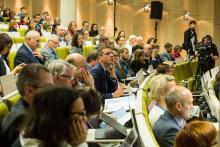While the education offered by EU countries tends to be of high quality, our traditional teaching and learning practices and the knowledge on offer do not sufficiently meet the emergent demands of a world in flux. The generational gap in values and behavioural patterns is deepening. How do we ensure that our children and young people are satisfied with their educational experience – that they are happy to attend school and further educational institutions whilst also gaining required knowledge and competencies? How do we ensure young people become open to the world, willing and capable of assuming supportive as well as leadership roles, and that they take responsibility for the wellbeing of the world around them? Best practices capable of meeting these demands can be found across Europe including in Estonia. The conference aims to shine a light on these and discuss how they can be applied more widely, and calls on European countries to devote greater coordinated attention to the changing roles of teachers, schools and other educational institutions.
The conference also seeks to build a shared and coherent understanding of key educational research results and how these can support student learning and achievement. Our challenge is to find evidence-based, effective and efficient ways of ensuring our education systems evolve in an optimal manner to address both long-standing and newly emerging needs. We invite participants to contribute to discussions about best practices and their widespread implementation organised around the following three main overlapping themes:
- stakeholder engagement,
- educator and learner engagement and autonomy,
- the building of effective learning environments that address the needs of a world in flux.
Presentations and video recording of the conference at https://www.hm.ee/en/estonian-eu-council-presidency-conference-contempor...
